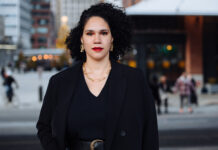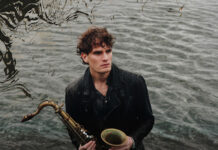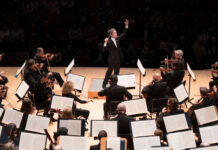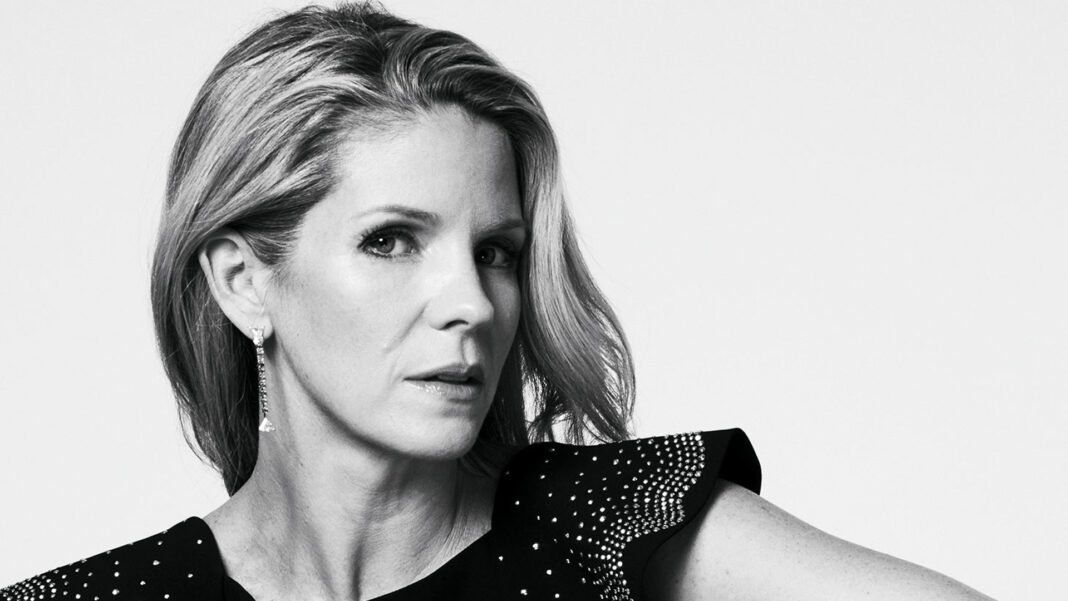
The first time I saw Kelli O’Hara on stage, I had no idea she would become that Kelli O’Hara. Little did I know the woman who would so mesmerize me as Clara in Adam Guettel’s The Light in the Piazza or make me laugh in the 2019 revival of Kiss Me Kate was the same young woman I saw as Young Hattie in the 2001 revival of Stephen Sondheim’s Follies.
O’Hara has gone on to great acclaim and 8 Tony Award nominations. Her only win, so far, was for the 2015 revival of The King and I. She most recently appeared in Guettel’s Days of Wine and Roses. Television audiences know her for her role as Aurora Fane in The Gilded Age.
This Saturday, Los Angeles Opera will present Kelli O’Hara in Concert at the Dorothy Chandler Pavilion in Los Angeles. She won’t have any characters to portray. She will be doing what many artists consider to be amongst their toughest roles: being themselves.
Two weeks ago I spoke by phone with O’Hara about the concert, the composers who inspire her and the time when she worked with Martin Scorsese. What follows are excerpts from our conversation that have been edited for length and clarity.
Q: What are the challenges for you on putting on a show and being Kelli O’Hara representing yourself versus taking the stage under the guise of a character?
I love this. I love doing both. It’s being an actor. There’s nothing better than going into a character and really studying everything about that particular person and time. But when I put these shows together for myself, I’m really trying to tell my story. That comes pretty easily because I’ve lived it. I’m trying to choose what things from those characters feel like being expressed again on stage through me in different ways. Telling stories about those experiences in those characters and how I felt about them. But also singing songs and telling stories about my personal life so that an audience coming to see [me can] learn a little bit more about what I do.
This concert is with LA Opera. Does that inspire you to perhaps include more work from your opera career versus your Broadway career?
Nope, not at all. I have some pieces of music within my solo concerts that touch on my past history and relationship with opera. And also my voice sounds the way it sounds. So there are some things that probably feel a little bit more classical in their own ways, but none of them is deliberately operatic. Except for, in one case, for humor. I think that in telling my personal story through music, I tend to lean toward theater music, folk music, original music or Sondheim or someone who can write life pretty well. It’s more about the lyrics and less about bel canto.
I saw you in Follies.
My goodness. That’s a throwback.
I saw you as Dot in Sunday in the Park with George and I know you voiced the giant for a production of Into the Woods. Are there other Sondheim roles you’d love to do? Clearly Follies offers you more opportunities now than it did when you were the younger version of another character.
That particular show is ripe with great characters. Look, I would probably play any Sondheim role that came across, although I’m not going to ever tackle Gypsy. I don’t want to. The way he writes, I would bend myself over backwards to make any of it work, because it all makes sense to me. I would love to have surprised people doing Sweeney Todd because I love it. I would love to sing George in Sunday in the Park with George. It doesn’t matter if it’s the female or the male role. I tend to feel a lot of things with his writing. Now, granted, I have to , which I do a lot of times in musical theater, make my own version of it. Because the typical way of singing these Sondheim songs is not exactly how I would or I can do it. So that’s the great challenge as well.
Another significant composer for you is Adam Guettel. I saw The Light in the Piazza twice. Sadly, I missed Days of Wine and Roses. What did appearing in both those shows – and I know you were instrumental in Days of Wine and Roses even happening – or singing How Glory Goes at Gavin Creel‘s Memorial; what have those experiences meant to you and how do those experiences resonate with you today?
When I was first starting this career and coming out of an opera degree, I didn’t know where I belonged. I really didn’t. I grew up singing country music. I went to school [for] musical theater because I loved movie musicals. I didn’t have any live theater around me. I was learning as I went. Believe me, I was as green as they come. But when I decided I wanted to be an actress and not go to opera grad school, I moved to New York to go to acting school. When I met Adam, it put the two things together.
I truly believed in that moment, musically, that I had found something I could do. Like that could be just for me. I know that’s cliché to say, but like this is how I’m supposed to be singing. I was born to sing this music. I feel like his music, whether it be Myths and Hymns or How Glory Goes from Floyd Collins or the two shows I’ve done as well. Three! I’ve done workshops of his upcoming Millions. They feel easy and and right and so it’s been such a gift to be able to be in a couple of them. Singing How Glory Goes for Gavin was not easy. But the sentiment and the way the lyrics matched the melodies and the emotion is just magical to me. I’m so proud of it.
Matthew Morrison told me that The Light in the Piazza was the toughest music he’s ever performed. How challenging was it for you?
I was there from the very first workshop and I sang the role of Franca. Her music was extremely challenging. I was just out of opera, so I was asking Adam to put high F’s and things in there. I was doing all this stuff to just have fun, not knowing that it would be something that would last and go on a page. So I remember that being very difficult because there was nothing to refer to. It was being written right then. But for some reason it’s hard to learn. In the very beginning, Days of Wine and Roses was as well.
I think back to the people who heard Sondheim the first time and did they think, this is crazy? What is this crazy stuff? What happens is once you learn it, it’s like you never could have not known such a clear thing. That’s how it feels to me. And I think that’s how it feels to a lot of musicians. It just ends up making so much sense with the sentiment that goes along with it. When writers write both the lyrics and the music like that, they’re marrying them so beautifully.
Days of Wine and Roses isn’t the standard fare that succeeds on Broadway today. What role do you think musicals like that can have in commercial theater today?
I know that we didn’t run for very long, but other musicals that have taken that chance, like Next to Normal and Fun Home, they won the Pulitzer. They’ve gone on tours. They continue to thrive. Even shows like Bridges of Madison County, that didn’t run that long, has toured all over the place. I think we have to kind of reassess what commerciality looks like a little bit.
Not everything can be Wicked or Hamilton, but I think both are great examples of good art that’s lasted. But I think that we also have to strive to do more than just jukebox musicals, which I think are really fun. There has to be room for sort of thorny, deep storytelling and songwriting to go along with something that feels really fun and free. I just don’t think having the same type of thing just because it might seem commercial is what making art is about – even on Broadway. Especially on Broadway.
You did an interview with The Interval ten years ago April. You were asked about audience expectations that you deal with as a performer. What are your own expectations that you have to conquer each time you get on stage?
Wow. I wonder what I said back then. You know, you have a lot of expectations for yourself if you’re someone who has pride in your work and wants to be useful in the storytelling relationship with an audience. The expectations I have for myself are to be prepared and have done my work and go out and use the best of my abilities that day. And whatever it is that I’m dealing with, continue to tell the story and do my job. The more I invest in fulfilling that expectation, the job becomes easier because I lose myself in it as well as, hopefully, the audience does in watching it.
We met briefly during the filming of The Key to Reserva directed by Martin Scorsese. What did you learn from that experience with Scorsese that informed how you went about approaching film and television acting?
It was more for me about the evoking a certain image of Eva Marie Saint. I had no lines. It was about this sort of look and this breathy fear. And I love embodying that. But really what I took away from that experience, less as an actor, but more of a person in this business being lucky enough to work among any genre of this art, was to sit there with him in video village and have him talk about why he wanted to make films in the first place. [His] being a sick kid and looking out the window and then turning his attention to film and falling in love with the imagination of the stories that he was watching because he wasn’t living it in real life.
I remember taking away with me that passion and that sometimes things that we don’t know that happened to us that are maybe terrible, but then they create something else if we allow it. If we’re open to it. If we look for it. That really moved me as a person in the art because I’ve always thought of him as someone who just freaking loves what he’s doing. He wants to make things that are interesting to him and tell stories like that. From a young age, I think I made a decision because of who I am that I want to do this because it can change lives. It can tell stories and it can heal and there’s empathy in it. It’s one of those things where it’s worthy of something and purposeful and not just commercial or star making.
Your 2008 album was called Wonder in the World. As an artist, as a parent, what role does finding wonder in the world allow you to make your way through the world today?
It’s everything. If I didn’t pay attention to anything or if I had my head in the sand about things because it might be easier – especially times like this – I wouldn’t I wouldn’t be able to show up for my children, anyone or anything. Paying attention to what’s happening in my field, paying attention to what’s happening with them, not only allows me to be of service to them and to be a better actor/performer. It makes me a better citizen. I feel like that informs my work choices and informs what I want to put out into the world. Not as an image, but as a truth about myself. It makes me make decisions and some that have been hard about my life. Do I take this job if it is going to hurt my family? No. You know, that kind of thing.
It’s finding wonder to then inspire me to do more or inspire me to encourage my children to do more. It’s what it’s all about. The last thing I want to do is be turned off or throw in the towel about anything. It’s a constant discovery. And I think that comes from from being willing and humble enough to know that you just don’t have it all figured out ever.
You are quoted as having said, “Playing characters allows me to do things I may not may not always do. While singing in concerts allows me to really find my own voice and grow.” How do you think the young girl from Elk City, Oklahoma, would respond if she heard what your voice has grown into as you perform this concert on February 1st in L.A.?
I can really be honest without sounding cliché that I’ve never thought that any of this was expected. I probably spend more time wondering when it might go away. I, being someone who didn’t really have this certainty at all, it was a very, very big mystery for me. I feel grateful all the time. It’s not that I don’t worry or wonder what’s next, but I find myself pretty darn grateful that it’s still working and I’m still finding work and having it. It makes me, in performance, want to give back and want to be generous with all that. So she’d be pretty blown away, I think.
Main Photo: Kelli O’Hara (Photo by Sebastian Kim/Courtesy LA Opera)











